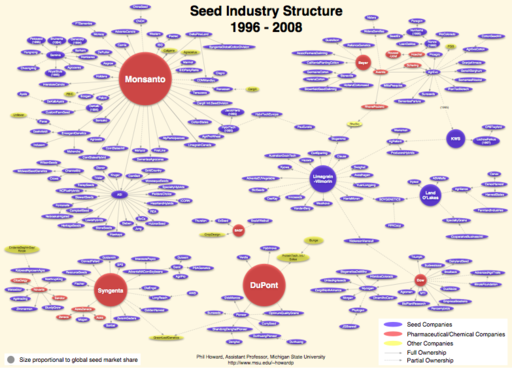Grieves
Senior Member
As I've stated before, the problem with GMO's isn't necessarily the science. They do seem to be rushing it a little, and regulation where food is concerned is in a pretty sorry state (apparently at least 3/10 of chemical food additives approved by the FDA were never actually tested), but the real insidious element as stated by others in the thread is the power it can give corporate culture over not only the farmers doing the growing, but far more importantly the communities those farmers support. It's no conspiracy theory to say that Monsanto is seeking to gain dominance over global agriculture, and beyond that stake their claim within every morsel of food grown on the planet, regardless of whether it's farmed. This is their openly stated aspiration and corporate goal, not a plot hatched in shadows... but that makes it no less profoundly dangerous, as at their current rate of growth it can only be said that they're succeeding. Anyone who thinks a corporation like Monsanto has the best interests of mankind at heart while striving for this dominance is kidding themselves. The potential harm such a corporation could do across the globe is staggering. At a time when drought has starvation running rampant, massive crops of GMO's are being rendered into ethanol, or used to fatten cattle for well-marbled cuts in the west/Europe, driving up prices beyond the means of millions. The global food market can have devastating unforeseen effects on local communities , we've no organization capable of effectively regulating such a market, and Monsanto very keenly wants all food production to be a part of it. That's a bad mix, and is only going to end in tragedies... albeit at a likely distance.
As to Cairenn's comment about the Russians, she's not wrong, there's a fair deal of anti-GMO sentiment in Russia. Again, I think this is far more about preservation of sovereignty where the country's food supply is concerned than it is about concerns over the science. Russia's been discreetly violated in the ear by American corporate interests in the past, and could very understandably be wary of letting Monsanto step in and hang its coat up in their country.
As to Cairenn's comment about the Russians, she's not wrong, there's a fair deal of anti-GMO sentiment in Russia. Again, I think this is far more about preservation of sovereignty where the country's food supply is concerned than it is about concerns over the science. Russia's been discreetly violated in the ear by American corporate interests in the past, and could very understandably be wary of letting Monsanto step in and hang its coat up in their country.


